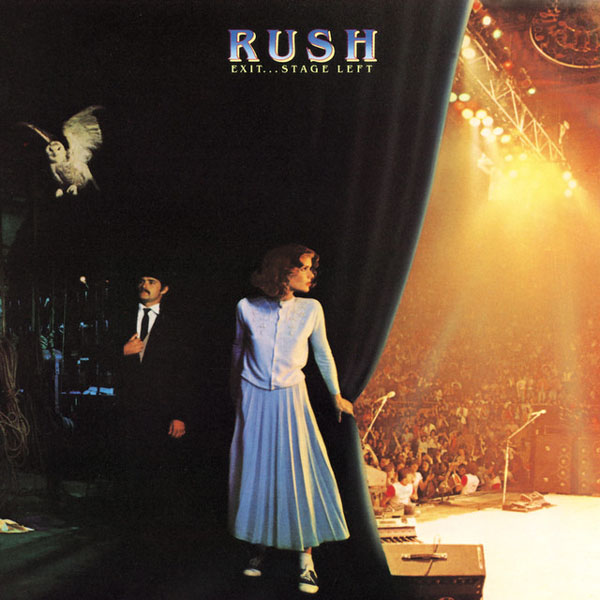Exit...Stage Left Album Review
By Jon Pareles, Rolling Stone, February 4, 1982, transcribed by Jimmy Lang/Meg Jahnke

2 1/2 stars given (out of 5)
Rush have been unfairly maligned as just another barnstorming heavy-metal act, fit only to vibrate arena walls. Actually, the group is a lot more interesting than cock-rockers like Van Halen or AC/DC, and far less compromised than Journey or Styx. "We didn't change, everybody else did!" proclaim the liner notes to their second live set, Exit...Stage Left, and, in a way, they're right. Rush represent the last profitable gasp of high-minded "progressive" rock, the province of virtuosic, storytelling, philosophizing bands that attracted huge audiences in the early Seventies.
Now that Yes have been shaken up, Genesis have gotten hip and even Kansas are in limbo, Rush have the underground-FM, "oh, wow"-profound market to themselves. True, Rush are a comedown from the early Yes they ravage, but at least they never mush out like Genesis. Their power-trio lineup keeps them hard-edged, despite the occasional synthesizer whoosh. And they're more single-mindedly propulsive than their forebears. Rush's ingenuity is channeled into complicated riffs below triumphant major chords, with Alex Lifeson's guitar serving largely as reinforcement for Geddy Lee's mammoth bass tones. Both live and in the studios, Rush's mixes make everything above the midrange sound like an afterthought - and that's just as well. Though Lee's falsetto isn't a shriek anymore, drummer Neil Peart's lyrics can still irritate. Taking individualism to Ayn Rand-inspired extremes, Peart's most pessimistic screeds suggest that in the upcoming apocalypse, every-man-for-himself will turn into a jump-the-other-guy.
There's not much propaganda on Exit...Stage Left - only "The Trees" (the maples unionize and, in the name of equality, destroy the taller oaks), "Free Will" (the group is for it) and "Tom Sawyer" (hardly the fun-loving guy Mark Twain invented). The rest of the record includes pessimistic fables ("Red Barchetta"), travelogues ("A Passage To Bangkok"), hippie-isms ("The Spirit Of Radio") and instrumentals ("YYZ" and "La Villa Strangiato," minus its original subtitle). Except for a singalong in "Closer to the Heart" and a jokey intro to "Jacob's Ladder," the versions here are virtually identical to the studio renditions, so Rush fans may find the set redundant. Others might get a kick out of the big, surging E chords the band keeps pumping out and perhaps appreciate Peart's fine-tuned percussion, but one Rush album (preferably Moving Pictures) should be enough for almost anybody.
Just about everything Rush do can be found, more compactly, in Yes' "Roundabout," with the remainder in Genesis' "Watcher of the Skies." Everything except the philosophy - and stage left is, of course, to the audiences's far right.